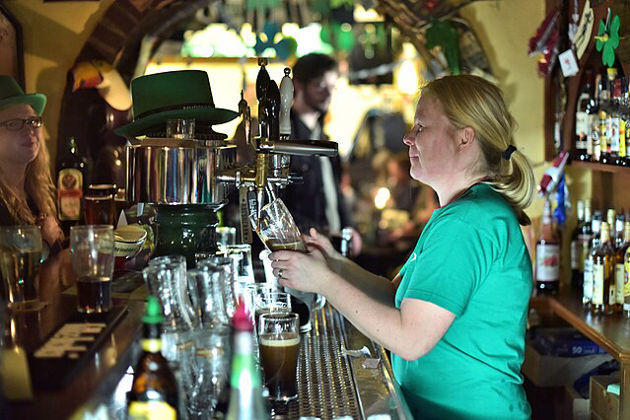World
Alcohol Misuse Costs Irish Workplaces €8.5 Billion Annually

Alcohol misuse is significantly impacting Irish workplaces, costing an estimated €8.5 billion each year in lost productivity. This figure is highlighted in a new report by Alcohol Action Ireland (AAI), an advocacy group focused on reducing alcohol-related harm. The group is urging the Irish government to implement stronger measures to tackle what it describes as a “significant economic and social burden.”
The report, titled Alcohol’s Cost to the Workplace, underscores the destructive effects of alcohol on employment and productivity. While the broader implications of alcohol misuse, including its impact on public health and safety, are well-documented, AAI emphasizes the specific ways in which harmful drinking habits affect workers and employers alike.
Workplace Culture and Its Role
One of the report’s key findings indicates that workplace culture can sometimes promote unhealthy drinking behaviors. This can stem from social norms or inadequate support systems within organizations. AAI argues that both employers and trade unions have an essential role in fostering supportive environments that discourage alcohol misuse.
The report suggests that positive workplace measures, such as fair treatment, recognition, opportunities for skills development, and strong social networks among colleagues, can mitigate the risks associated with alcohol misuse.
The study presents alarming statistics regarding the effects of alcohol on productivity. Heavy drinkers are 22 times more likely to miss work due to alcohol-related issues compared to low-risk drinkers. More concerning is the phenomenon of “presenteeism,” where employees are present at work but underperform due to health or emotional challenges. The report attributes 77 percent of productivity losses to presenteeism, while absenteeism accounts for just 23 percent.
Alcohol misuse does not only lead to immediate productivity loss but also heightens the risk of long-term unemployment. Research indicates that heavy drinkers are up to five times more likely to experience joblessness compared to their light-drinking counterparts.
The Broader Economic Impact
Dr. Sheila Gilheany, AAI’s chief executive, highlighted the scale of this issue: “Alcohol is by far the most used psychoactive substance in the workforce. Many people consume it in harmful patterns that heighten the risk of social, legal, medical, occupational, and economic problems.” The report reveals that more than half of Irish drinkers fall into the hazardous category, with 578,000 people meeting the criteria for an alcohol use disorder (AUD). Of these, around 90,000 are classified as having a severe level of AUD.
Beyond productivity losses, alcohol impairment poses significant safety risks. Employees who are under the influence or even hungover are more prone to accidents and injuries, resulting in workplace disruptions. According to AAI, the consequences of alcohol misuse are “multifaceted.” Employees face negative health impacts, colleagues bear heavier workloads, and employers risk losing their competitive edge.
Overall, alcohol-related harm costs the Irish economy approximately €14 billion annually, representing 2.5 percent of the nation’s GDP. Notably, workplace losses account for the largest share of this economic burden.
In light of these findings, AAI insists that the government must adopt stronger policies to mitigate the damage caused by alcohol misuse in workplaces, emphasizing the need for comprehensive strategies that address both individual and societal challenges.
-

 Top Stories3 months ago
Top Stories3 months agoTributes Surge for 9-Year-Old Leon Briody After Cancer Battle
-

 Entertainment4 months ago
Entertainment4 months agoAimee Osbourne Joins Family for Emotional Tribute to Ozzy
-

 Politics4 months ago
Politics4 months agoDanny Healy-Rae Considers Complaint After Altercation with Garda
-

 Top Stories4 months ago
Top Stories4 months agoIreland Enjoys Summer Heat as Hurricane Erin Approaches Atlantic
-

 World5 months ago
World5 months agoHawaii Commemorates 80 Years Since Hiroshima Bombing with Ceremony
-

 Top Stories3 months ago
Top Stories3 months agoNewcastle West Woman Patricia Foley Found Safe After Urgent Search
-

 Top Stories5 months ago
Top Stories5 months agoFianna Fáil TDs Urgently Consider Maire Geoghegan-Quinn for Presidency
-

 World5 months ago
World5 months agoCouple Convicted of Murdering Two-Year-Old Grandson in Wales
-

 World5 months ago
World5 months agoGaza Aid Distribution Tragedy: 20 Killed Amid Ongoing Violence
-

 World5 months ago
World5 months agoAristocrat Constance Marten and Partner Convicted of Infant Murder
-

 Top Stories4 months ago
Top Stories4 months agoClimbing Errigal: A Must-Do Summer Adventure in Donegal
-

 Top Stories4 months ago
Top Stories4 months agoHike Donegal’s Errigal Mountain NOW for Unforgettable Summer Views









